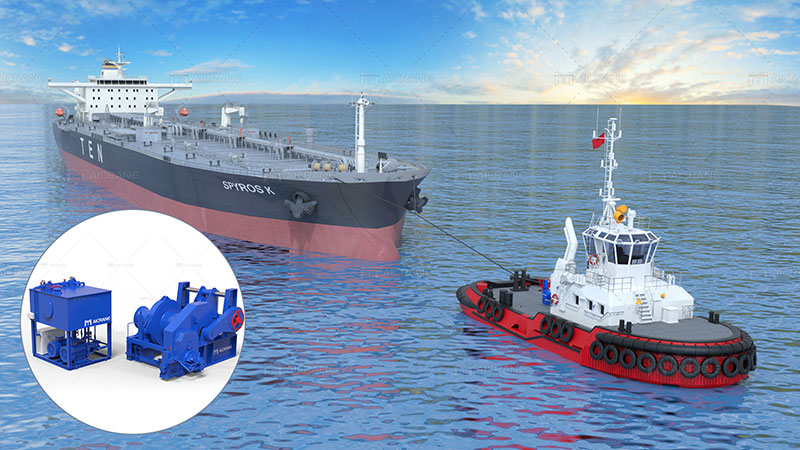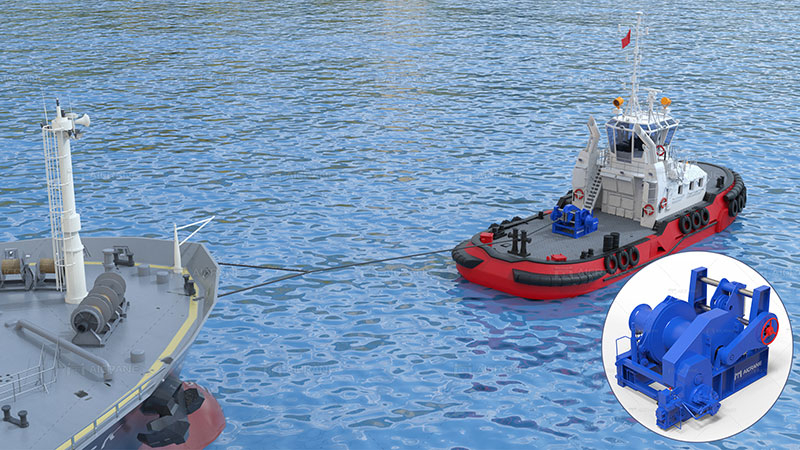The vast expanse of the open sea presents unique challenges, especially when it comes to marine applications that require towing. Whether it’s the demanding task of salvaging a stranded vessel, securing an oil rig, or simply assisting ships in distress, choosing the right towing winch is of paramount importance. In this article, we will explore the critical factors that go into selecting the perfect towing winch for marine applications.
I. The Crucial Role of Towing Winches in Maritime Operations
Marine towing winches are the unsung heroes of the maritime industry. They provide the necessary power to pull, anchor, or hoist heavy loads in waterborne environments. From towing disabled vessels to handling heavy cargo, these tow winches are essential in ensuring the safety and efficiency of maritime operations.

II. Types of Marine Towing Winches
Towing winches designed for marine use come in various types, each tailored to specific tasks and environments:
A. Electric Winches
Electric winches are versatile and commonly used in marine applications. They are relatively easy to install, offering a reliable power source for towing. These winches are ideal for tasks like anchoring and securing smaller vessels.
B. Hydraulic Winches
Hydraulic winches are known for their impressive power and control. They are particularly suitable for heavy-duty marine applications, such as salvaging shipwrecks or handling large cargo. However, they often require a hydraulic power source on the vessel.
C. Pneumatic Winches
Pneumatic winches are a solid choice when electricity or hydraulic systems are unavailable or impractical. These winches are lightweight, making them a good fit for smaller boats and maritime activities in remote locations.
III. Considerations for Selecting the Right Marine Towing Winch
Selecting the right towing winch for marine applications involves several crucial considerations:
A. Weight Capacity
The winch’s weight capacity must align with the intended marine tasks. For instance, offshore oil rigs require winches with substantial lifting capacities to move heavy equipment and machinery, while smaller vessels may suffice with winches designed for boat recovery.
B. Marine Environment
Marine environments are harsh and corrosive. A winch designed for marine use must be constructed from materials that can withstand saltwater exposure, UV rays, and the test of time. Stainless steel, aluminum, and high-quality coatings are often used to protect against corrosion.
C. Line Speed and Length
The line speed and length should match the specific requirements of the operation. For example, faster line speeds are essential for emergency towing situations, while longer lines may be necessary for anchoring or mooring purposes.
D. Power Source Compatibility
Ensure that the power source on your vessel is compatible with the chosen winch type. Electric towing winches are the most widely used, but hydraulic and pneumatic winches may be necessary for specialized operations.
E. Safety Features
Safety is paramount in the maritime industry. Select a winch that incorporates safety features such as emergency stop buttons, overload protection, and fail-safe mechanisms to prevent accidents during towing operations.
F. Compatibility with Vessel Type
Consider the size and type of your vessel. Different marine vessels, from fishing boats to oil tankers, have varying needs. The towing winch should complement the vessel’s design and purpose.

IV. Towing Winch Accessories
In addition to the winch itself, various accessories can enhance its functionality and safety in marine applications:
A. Fairleads
Fairleads guide ropes or cables smoothly onto the winch drum, reducing wear and ensuring efficient spooling. They are particularly useful when towing heavy loads.
B. Remote Controls
Remote controls allow operators to maintain a safe distance from the winch during operation. This is especially important in marine applications where space may be limited or the environment is hazardous.
C. Load Monitoring Systems
Load monitoring systems provide real-time data on the tension and weight being pulled by the winch. This information is invaluable for preventing overloading and ensuring safe towing operations.
V. Maintenance and Care
Once you’ve chosen the right towing winch for your marine application, it’s essential to prioritize regular maintenance to ensure longevity and reliability. The saltwater environment can be particularly harsh on marine winches, so routine inspections, lubrication, and cleaning are critical. Additionally, following the manufacturer’s maintenance guidelines is essential to prevent breakdowns and accidents.
VI. Conclusion
In the maritime industry, selecting the right towing winch is not just a matter of convenience; it’s a matter of safety, efficiency, and success. The unique demands of marine applications require careful consideration of factors like weight capacity, environmental resilience, and power source compatibility. By choosing the appropriate towing winch and accessories, along with diligent maintenance, maritime professionals can navigate the waves with confidence and reliability, ensuring the safety and success of every towing operation on the open sea.